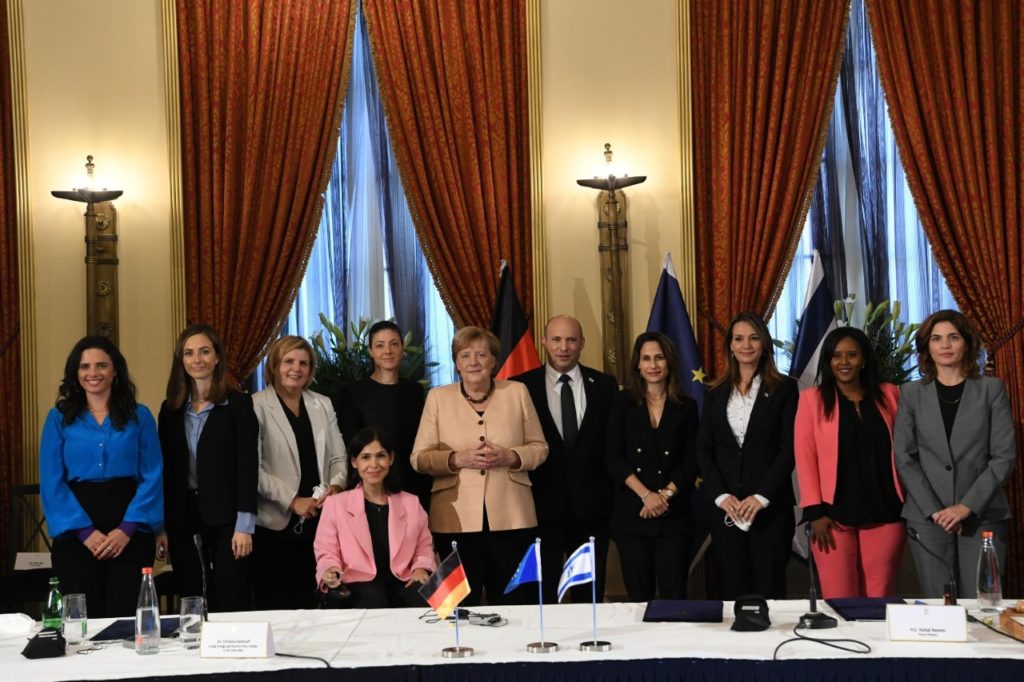Chancellor Angela Merkel visited Israel on Sunday on her last visit to the country while still in office after the German elections.
This was her seventh visit to Israel in 16 years in office. She is considered as one of Israel’s greatest friends in the EU. When she spoke in 2008 at the Israeli parliament, she said that, “Israel’s security, to me, is unambiguous and not up for debate. Germany will never leave Israel on its own and will always be on her side.”
Despite Germany’s support to Israel during her tenure as chancellor, her relations with former prime-minister Netanyahu deteriorated and she did not meet him, now turned opposition leader, during the visit. For a change, the meeting between Merkel and Bennet took place with the EU flag placed between the flags of Germany and Israel.
Her visit included a joint government meeting, a private meeting with Israel’s new prime minister Naftali Bennett, meetings with Israeli entrepreneurs and a tour of Yad Vashem Holocaust Remember Centre. She insisted to meet especially the nine female ministers of the new Israeli government who make up one third of the 27 ministers.
“During my term in office I have tried together with all members of my government to work hard to make the relationship between both our countries and peoples even stronger and broader, for example through the inter-governmental consultations,” she said. “It is not only matters that affect our past that play a part, but also our look to a common future.”
“I want to use this opportunity to emphasize that the topic of Israel’s security will always be of central importance and a central topic of every German government.”
During her time as chancellor, the air forces of the two countries held joint exercises, Germany sold submarines to Israel and Germany mediated in prisoner swaps between Israel and its enemies.
She said jokingly, that “compared with your government, a German coalition government seems a very simple matter." After the fourth elections in two years, the Israeli government consists of a fragile coalition of eight parties across the political spectrum which still has to pass the state budget to survive. Bennett’s party won only 7 mandates after he lost his political basis among the voters.
“Sometimes a leader makes a profound difference and I think your leadership paved the foundation for an ongoing commitment of Germany to Israel’s security and we very much appreciate it;” Bennett said. “It has never been stronger; it has become more than just an alliance. We’re looking forward to strengthening it even more in business relations, science, education, health and of course, in security”.
“You serve as the moral compass of Europe with your uncompromising support of Israel,” he added. “We certainly remember history and we look optimistically to a brighter future. My government will continue the ongoing relationship but our new government also brings a new spirit, a new spirit of goodwill.”
At the meeting with Merkel, Bennett described his government as the most diverse government in Israel’s history. “We have left and right, Jews and Muslims, religious and secular - and it’s working, we’re getting together pretty well. It’s also the most female government in Israel’s history, with nine ministers and I think that’s one of the reasons it’s actually working.”
Differences of opinion
Merkel took the opportunity at a press conference to say that the two-state solution must no be taken off the table. Bennett has excluded political talks with the Palestinian Authority to resume the peace process and said at the press conference that a Palestinian state would pose a terrorist threat against Israel’s security.
At his speech on 27 September at the UN General Assembly he did not even mention the Palestinian issue besides saying that “Israelis don’t wake up in the morning thinking about conflict”. While appearing to be in denial of the unsustainability of the current situation, he said at the meeting with Merkel that, “We’re not ignoring the Palestinians. There are our neighbors and not going anywhere.”
His policy is to “shrink” the conflict by focusing on economic development in the Palestinian territories (“economy in exchange for security”) but not much of this has been seen until now. In fact, the extremists in his own party and other rightist parties in the coalition do not allow him to take any political initiatives even if he wanted.
Yair Lapid, Israel’s foreign minister and alternate prime minister who is supposed to replace Bennett as prime minister in 2023, is considered to be more open to a compromise solution. But even he did not mention the Palestinian issue and how it should be resolved in a recent op-ed on “the first 100 days of a different foreign policy”.
On another current issue – the future of the nuclear deal with Iran - the two sides also expressed different views.
Israel continues to warn against resuming the nuclear deal (JCPOA) with Iran because it might allow it to become a nuclear threshold state and continue its destabilizing activities in the region. Merkel said that, “we have to return to the negotiation table”. Germany as one of the signatories of the original agreement in 2015 thinks that a deal is better than no deal at all.
M. Apelblat
The Brussels Times

